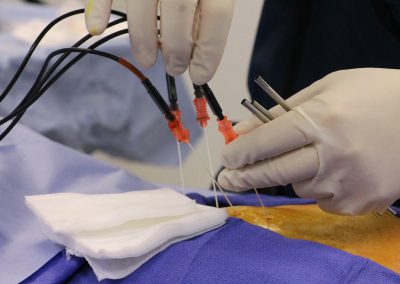
Procedures
Radiofrequency Ablation in NJ - So You Can Live Pain-Free
Outpatient procedure for treating neck, upper and lower back pain, shoulder, hip and knee pain
Schedule an AppointmentRadiofrequency Ablation Facts & Information
A radiofrequency ablation (RFA) is also called thermal coagulation or rhizotomy. Radiofrequency (RF) rhizotomy is a therapeutic and diagnostic procedure designed to decrease and/or eliminate pain symptoms arising from degenerative and inflamed joints. The procedure involves disrupting nerve function surrounding the effected joints with radiofrequency energy. This energy is converted into localized heat destroying these nerves which disrupts the communication link between pain signals from the specific joint to the brain.
Our first step is to verify the area where the pain originates by performing a nerve block injection with local anesthetic. This will confirm that this specific nerve is the pain generator.
This outpatient procedure is minimally invasive. Mild sedation can be requested, however you will need to be awake and able to answer questions during the procedure to provide important feedback to the physician.
What Happens During Radiofrequency Ablation?
The procedure itself involves a thin needle electrode placed adjacent to the nerves of the degenerative inflamed joint. Needle placement is confirmed using a fluoroscope, a type x-ray. We will target the painful area by stimulating the nerve with low voltage electricity. The doctor will then check to make sure the correct nerve is being stimulated. Stimulation will cause the affected muscles to rhythmically contract and may reproduce your pain. After applying numbing medication we then apply heat to the nerve via the electrode attached to the radiofrequency generator. The heat cauterizes the nerve endings thus breaking the communication link to the brain. This is often repeated at more than one location.
After the Procedure
You will be monitored for up to 30 minutes after the procedure. When you are ready to leave, the staff will give you discharge instructions and a pain diary. It is important to fill this out because it helps your doctor know how the RFA is working. Take it easy for the rest of the day.
You may feel sore for one to four days. It may be due to muscle and nerve irritation. The operative area may feel numb, weak or itchy for a couple weeks. Once the local anesthetic effects have worn off, your usual symptoms may return and may be more severe for up to 5-7 days after the procedure.
Maximum pain relief normally comes in two to three weeks.
How long can I expect pain relief?
Nerves regenerate after an RFA, but how long this takes varies. Your pain may or may not return when the nerves regenerate. If it does, another RFA can be done.
Possible Conditions
Disclaimer: the content of the Website is for general informational purposes only and does not constitute advice of any kind. See the full User Agreement here.

Take Back Your Life
Fill out the form or simply give us a call to book your appointment and start feeling better.

Contact Us
Speak with one of our team members right away to get answers to your questions about insurance verification, scheduling an appointment, and our clinic locations.
(732) 955-0655Visiting our Book Appointment page you can instantly request an appointment at any of our Seacoast Spine and Sports Medicine. We offer Free Insurance Verification before your appointment.
Learn how to easily get to the Seacoast Spine and Sports Medicine.
